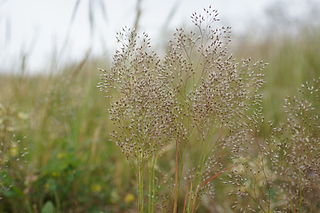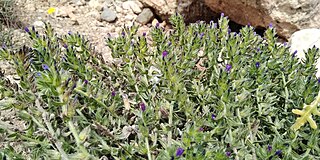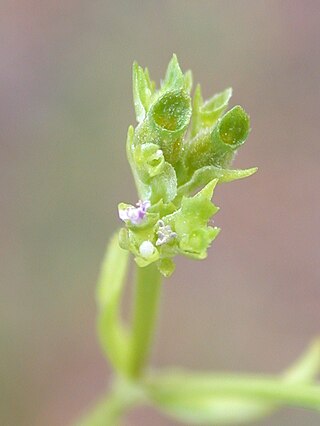
Callitriche marginata is a species of aquatic plant known by the common name winged water starwort. Callitriche marginata is native to the west coast of North America from British Columbia to Baja California, where it grows in and around vernal pools.

Callitriche is a genus of largely aquatic plants known as water-starwort. Previously, it was the only genus in the family Callitrichaceae. However, according to the APG II system this family is now included in the Plantaginaceae. The family name Callitrichaceae retains its status as nomen conservandum.

Tripodion tetraphyllum is a species of flowering plant in the legume family, Fabaceae. It is an annual herb, commonly known as annual kidney vetch, native to the Mediterranean Basin of southern Europe, North Africa, and western Asia. It grows in the Mediterranean–Sahara transition zone of North Africa, and in anthropic landscapes. It is the sole species in genus Tripodion, which belongs to subfamily Faboideae.

Callitriche antarctica, commonly known as the Antarctic water-starwort, is a small, prostrate plant with tiny yellow flowers in the family Plantaginaceae. It is found in wet places on many subantarctic islands and has a wide circumantarctic distribution, something reflected in its specific epithet.

Callitriche brutia, the pedunculate water-starwort, is a dwarf amphibious annual or perennial dicotyledon herb in the genus Callitriche. The common name of this species is water starwort. It colonizes aquatic environments, such as wetlands, lakes, rivers, streams, and pools, and it grows in oligotrophic conditions, meaning it grows in an environment that has little to sustain life. Pedunculate water-starwort was found in Ireland and England, but is now an invasive species due to its resistance to environmental stressors, and its ability to grow in still water.

Callitriche palustris, the vernal water-starwort, narrow-fruited water-starwort, or spiny water starwort, is a species of aquatic plants. It is the type species of its genus.
Callitriche pulchra, the beautiful water starwort, is a plant that was listed on the 2012 IUCN Red List of Threatened Species, based on specimens gathered on Gavdos island, Crete by H. D. Schotsman. Additionally, two of Pamapani's specimens were identified at Le Due Palme. Schotsman thereafter classified in 1968 in three different ponds located in Cyrenaica. In 2015 Callitriche pulchra was detected in Cyprus, somewhat reducing its endangered status. Other locations it has been encountered include Greece, Libya and Syria.

Callitriche hamulata is a species of flowering plant belonging to the family Plantaginaceae.

Aira cupaniana is a species of annual herb in the family True grasses. They have a self-supporting growth form and simple, broad leaves. Individuals can grow to 13 cm.

Echium arenarium is a species of plants in the family Boraginaceae. It is native to the Mediterranean coast.
Linaria chalepensis is a white-flowered plant found in southern Europe, belonging to the family Plantaginaceae.
Melilotus infestus is a species of plants in the family Fabaceae.
Sabulina mediterranea is a species of flowering plant in the family Caryophyllaceae (carpetweeds). It is an annual native to the Mediterranean Basin region, including parts of southern Europe, north Africa and western Asia.

Valeriana muricata, synonym Valerianella muricata, is a species of flowering plant in the family Caprifoliaceae. It is an annual which ranges from Greece and the Eastern Mediterranean through western and central Asia, the Caucasus, and the western Himalayas.
Veronica panormitana is a species of plants in the family Plantaginaceae.
Phalaris truncata is a species of plant in the family Poaceae. They are associated with freshwater habitat.

Sedum litoreum is a species of succulent annual herb in the family Crassulaceae. Individuals can grow to 3.7 cm. It is native to the central and eastern Mediterranean, from Corsica and Sardinia to Italy, Sicily, former Yugoslavia, Albania, Greece and the Greek Islands, Turkey, Cyprus, and the Levant.

Spergularia diandra, the alkali sandspurry, is a species of annual herb in the family Caryophyllaceae (carpetweeds). They have a self-supporting growth form and simple, broad leaves. Individuals can grow to 4.4 cm.
Taraxacum minimum is a species of plants in the family Asteraceae.
Trifolium lucanicum is a species of plants in the family Fabaceae.











